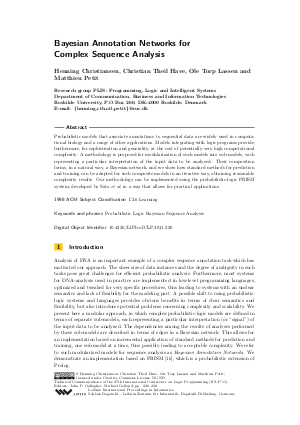Bayesian Annotation Networks for Complex Sequence Analysis
Authors Henning Christiansen, Christian Theil Have, Ole Torp Lassen, Matthieu Petit
-
Part of:
Volume:
Technical Communications of the 27th International Conference on Logic Programming (ICLP'11) (ICLP 2011)
Part of: Series: Leibniz International Proceedings in Informatics (LIPIcs)
Part of: Conference: International Conference on Logic Programming (ICLP) - License:
 Creative Commons Attribution-NonCommercial-NoDerivs 3.0 Unported license
Creative Commons Attribution-NonCommercial-NoDerivs 3.0 Unported license
- Publication Date: 2011-06-27
File

PDF
LIPIcs.ICLP.2011.220.pdf
- Filesize: 456 kB
- 11 pages
Document Identifiers
Subject Classification
Keywords
- Probabilistic Logic Bayesian Sequence Analysis
Metrics
- Access Statistics
-
Total Accesses (updated on a weekly basis)
0Document
0Metadata
Abstract
Probabilistic models that associate annotations to sequential data are widely used in computational biology and a range of other applications. Models integrating with logic programs provide, furthermore, for sophistication and generality, at the cost of potentially very high computational complexity. A methodology is proposed for modularization of such models into sub-models, each representing a particular interpretation of the input data to be analysed. Their composition forms, in a natural way, a Bayesian network, and we show how standard methods for prediction and training can be adapted for such composite models in an iterative way, obtaining reasonable complexity results. Our methodology can be implemented using the probabilistic-logic PRISM system, developed by Sato et al, in a way that allows for practical applications.
Cite As Get BibTex
Henning Christiansen, Christian Theil Have, Ole Torp Lassen, and Matthieu Petit. Bayesian Annotation Networks for Complex Sequence Analysis. In Technical Communications of the 27th International Conference on Logic Programming (ICLP'11). Leibniz International Proceedings in Informatics (LIPIcs), Volume 11, pp. 220-230, Schloss Dagstuhl – Leibniz-Zentrum für Informatik (2011)
https://doi.org/10.4230/LIPIcs.ICLP.2011.220
BibTex
@InProceedings{christiansen_et_al:LIPIcs.ICLP.2011.220,
author = {Christiansen, Henning and Theil Have, Christian and Torp Lassen, Ole and Petit, Matthieu},
title = {{Bayesian Annotation Networks for Complex Sequence Analysis}},
booktitle = {Technical Communications of the 27th International Conference on Logic Programming (ICLP'11)},
pages = {220--230},
series = {Leibniz International Proceedings in Informatics (LIPIcs)},
ISBN = {978-3-939897-31-6},
ISSN = {1868-8969},
year = {2011},
volume = {11},
editor = {Gallagher, John P. and Gelfond, Michael},
publisher = {Schloss Dagstuhl -- Leibniz-Zentrum f{\"u}r Informatik},
address = {Dagstuhl, Germany},
URL = {https://drops.dagstuhl.de/entities/document/10.4230/LIPIcs.ICLP.2011.220},
URN = {urn:nbn:de:0030-drops-31649},
doi = {10.4230/LIPIcs.ICLP.2011.220},
annote = {Keywords: Probabilistic Logic Bayesian Sequence Analysis}
}
